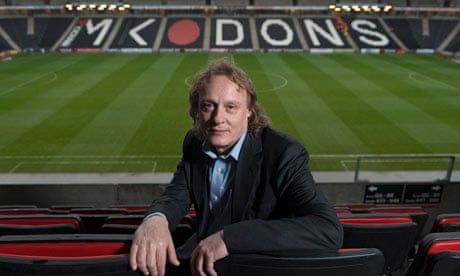From the upper tier of the vast, steepling, 30,000-seat stadium nearing completion for the current 7,500 regulars of MK Dons, the football club he infamously moved up from south London, Peter Winkelman is hitting back. Deluged with fury again over that move, of Wimbledon to Milton Keynes, Winkelman, the ex-music industry entrepreneur with his trademark shaggy hair and spectacularly persuasive manner, is raging against the supporters who founded their own club in response, AFC Wimbledon.
Since the fates drew AFC Wimbledon, still supporter-owned, triumphantly promoted last year into the Football League, to play Winkelman's MK Dons for the first time, in the FA Cup second round this Sunday, Winkelman has been seeking to cast off the role as a villain in the story. He prefaces his case by accepting that getting Milton Keynes a league club by moving an existing club from elsewhere, which he relentlessly promoted at the time, was, in hindsight, wrong.
"I did a deal that was wrong and the owners [of Wimbledon at the time] were wrong. I'm not proud of the way football came to Milton Keynes," Winkelman stated on Saturday, before MK Dons' sparkling 5-1 victory over Colchester United which raised his club to second in League One.
But then he argues – rather unconvincingly and, it feels, ill-advisedly – that the supporters were also wrong, for not buying Wimbledon when it sank into administration in 2003. "They deserted their club; they forced it to administration, then they didn't buy it," Winkelman argues. "The club had no other choice but to come to Milton Keynes, it was going to be liquidated."
The facts, though, are that most Wimbledon fans turned away when an independent FA panel sanctioned the move to Milton Keynes on 28 May 2002, by a 2-1 majority – Raj Parker, a commercial lawyer, and Steve Stride, then operations director at Aston Villa, voting for, Alan Turvey, the chairman of the Ryman League, against. Just two days later, they formed AFC Wimbledon and have in the decade since done what Winkelman persuaded the panel was impossible for Milton Keynes to do, raised their club up the football pyramid and into the league.
"We did the opposite of abandoning our club," says Kris Stewart, the leading campaigner against the Milton Keynes move, who became AFC Wimbledon's first chairman, from 2002-06. "The club died, and we did something positive, won back the Football League place stolen from us. We're proud of what we achieved."
Wimbledon fell insolvent in 2003 partly because most fans had left and were supporting AFC Wimbledon, working their way back from the Combined Counties League. "When it went into administration," Stewart says, "I can't remember anybody considering we should buy it; it had already died for us. The whole of football now realises what was done was wrong."
The supporters always resented the move's construction, understanding that planning permission would be given to Asda, and Ikea, to build massive stores on the edge of Milton Keynes, if a stadium were built too, and a league club had to be found to justify it. When you go there, sure enough, there is the enormous Asda, and other chain stores standing to attention around the stadium. But Winkelman dismisses the Wimbledon fans for belittling the scale of what he has built.
"People think it is easy; you get an Asda and build a stadium like this," he reasoned, rapid-fire fluent, sitting in the plush directors' lounge as Colchester's contingent stood in blazers and club ties, looking slightly lost. "Don't be silly. We've done something extraordinary."
Winkelman explains how he has done it, built this huge, high quality stadium, the retail park all around it, with a flourishing football club playing excellently under the impressive young manager he discovered, Karl Robinson. And you realise that coup most of football can still not believe he pulled off, persuading those two members of that independent panel, was just another day for him. The whole project was indeed dependent on Asda and Ikea; he talked them into backing him, Milton Keynes council, banks, other stores – he says 250 separate legal deals have been done so far.
He is deeply into it; his company, Inter MK Group, which owns the club and stadium, was £21m in debt to the Clydesdale Bank at the date of the most recently published accounts, for the year to 30 June 2011, the result, he says, of the building projects always going over budget. The club itself, with a players' wage bill of £3m a year – "Some players earn more than the prime minister, in League One," he says – loses money, £1.7m last year. In July he had to renegotiate a £5m loan to keep the project going "as a going concern"; he says he did, and since renegotiated again.
"When you are juggling these amounts of money in this credit crisis you have to juggle," he said. "They won't lend you any money for the football club, so we have to make the losses work with the money we have everywhere else. If you look at it, I started off with money, and now I have got debt. But I have a fantastic asset for it, so I'm not going to cry."
Having seen the opportunity to build a stadium Milton Keynes lacked, and realised Asda did not have a store in the town, Winkelman acquired options to buy the land from its three owners, including the council. Asda would not have been granted planning permission for a huge out-of-town superstore unless it gave the council the benefit of building the stadium. Wimbledon would move up, permission would be granted, then he would exercise the option to buy all the land, sell it to Asda and Ikea for very much more, and the difference would be used to build the stadium. Winkelman was originally going to facilitate that for Wimbledon, then give them the stadium, and be given a stake in the club and a seat on the board.
When the club went into administration, Winkelman faced the life-defining decision, of taking it on himself. Because Asda was backing him, he levered in other finance for the administrator to keep Wimbledon in existence, around £2m, he thinks, and £850,000 then to buy the club.
His deal of a lifetime came together: Asda paid £35m for the land, Ikea £24m. In total, £83m is to be spent building his high-quality stadium to 30,000 seats, filling in the bare concrete of the topmost tier, plus a 5,000-seat indoor arena, and the infrastructure around it. Despite the debt, he says the Hilton hotel at the front, income from McDonalds and KFC, the sales of other patches of land and the arena when it is built, will make the whole thing pay. "Everybody buys into the business plan."
Hunkering down within it on a rainy Saturday afternoon were 7,443 supporters, watching Robinson's mostly young team pass their slick, clean way to an attractive victory. The crowd amid the wide, empty spaces of Winkelman's as yet unfulfilled ambitions is amiable, agreeable and teeming with children. Andy Cullen, the marketing director who joined from Norwich, says 35% of fans are under 18.
Winkelman has always fixed his vision on that, arguing Milton Keynes is a young, growing "metropolis" and, particularly if MK Dons win promotion to the Championship, a regular fanbase will be built to steadily fill this space. "Will a 30,000-seat stadium look silly in 20 years' time?" Winkelman asks. "No. I don't think I will look so stupid in the end."
Robinson, reflecting on his players' fine performance, said of the MK Dons project: "This is a place where we can all create history, to change a city and culture. Very few football clubs have that opportunity."
Among a more vocal group of fans in the standard corner of the ground, John Brockwell, chair of the supporters' association, said he naively believed in 2002 they were saving Wimbledon, and wishes both clubs could celebrate what they have. Greg Poulton, 21, talked about how his life has been transformed by playing for MK Dons' disability team; disabled supporters are particularly well catered for in the stadium. John Read, a company director who has supported MK Dons ever since they arrived as Wimbledon in Milton Keynes, acknowledged: "It was wrong, fundamentally, that the club was moved here. But now it feels like supporting any other club."
"We're used to it," he grinned, of being regarded as football's illegitimate club. "People laugh at Milton Keynes, the concrete cows, the roundabouts, now the franchise. We can take the stick."
Yet that, apart from the hurt which endures within AFC Wimbledon, seems an enduring shame for MK Dons – and the young people who watch them. Introducing a football club to Milton Keynes was, Winkelman himself said, about giving a much-sniffed-at new town a binding identity, a heart and soul, amid the faceless town planning and corporations. It is sad that their club is always considered not quite genuine, that they did not do it properly, as AFC Wimbledon themselves proved clubs can. So the splendid stadium Peter Winkelman built, with millions from Asda, Ikea and banks, will echo on Sunday with heartfelt anger, from fans who felt their club was stolen to make it all happen.

